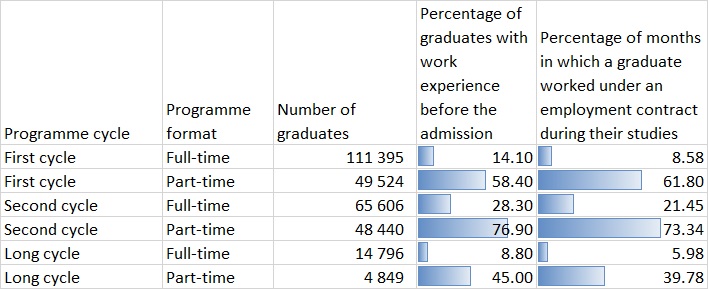
What were the majors of graduates who had worked under employment contracts or been self-employed before commencing their studies? Which graduates obtained work experience during their studies?
In recent years, a decreasing number of graduates and students have enrolled in higher education, and each new cohort is becoming less numerous than the previous one. Many new students already have work experience, and a growing number work and study simultaneously.
We tracked the professional experience of those who graduated in 2020. We analysed all fields of study (on the basis of their names) that were pursued by at least 100 students. Table 1 presents the fields whose graduates were most active on the labour market. It includes:
- the percentage of graduates who had worked under employment contracts or been self-employed before commencing their studies
- the percentage of months in which graduates had been employed under employment contracts during their studies.
Unsurprisingly, graduates of full-time degree programmes are less experienced than those of part-time programmes. Similarly, graduates of first-cycle bachelor's degree programmes are less experienced than those of second-cycle master's degree programmes. Differences are also noticeable among students of long-cycle master's degree programmes (including those specialising in law and medicine), who, due to the rigorous nature of those programmes, find it difficult to reconcile their working lives with their academic commitments. As a result, students of these programmes (particularly full-time degree programmes: see Table 1) rarely manage to combine studying with work.
Table 1. Work experience prior to and during studies: graduates of part-time first-cycle programmes

Below is a summary of the five groups of subjects that produce the largest shares of graduates who had gained work experience before commencing their studies or who had obtained it during their studies. The data is presented separately for full-time and part-time degree programmes at every level of study.
First-cycle programmes
Full-time programmes
The graduates of full-time first-cycle programmes with the most work experience gained before commencing their studies included those who majored in nursing and in safety engineering (Table 2).
In the case of nursing graduates, this may be explained by the presence of the bridging programmes that nurses who do not yet hold the necessary qualifications pursue, and by high demand for nurses on the labour market (the majority of nurses are currently over forty years old). As far as safety engineering is concerned, the reason may lie in the educational decisions made by those employed in the uniformed services: the subject relates closely to firefighting. Other students and graduates with considerable work experience included graduates of criminology and of European studies.
Table 2. The five fields of studies with the largest number of graduates who gained work experience prior to or during their studies: full-time first-cycle programmes

Part-time programmes
Part-time programme graduates with work experience included very high percentages of those who had worked before commencing their studies and of those who had been employed under employment contracts during their studies (Table 3). Again, nursing and safety engineering boasted the largest shares of graduates who had gained professional experience before obtaining their degrees. Other fields with considerable numbers of professionally active students included related areas, such as electrocardiology and manufacturing engineering. The work and study model was also popular among graduates of energetics, automation and robotics, and mining and geology.
Table 3. The five fields of studies with the largest numbers of graduates with work experience gained prior to or during their studies: part-time first-cycle programmes

Second-cycle programmes
Full-time programmes
Almost three-quarters of nursing graduates gained work experience before commencing their studies. Those who were employed during their studies worked for 75% of that time. A large group of midwifery graduates were also professionally active before and during their studies. Other fields with high percentages of students with work experience included quantitative methods in economics and information systems (a subject offered exclusively by Warsaw School of Economics (SGH)), enterprise financial management, and teleinformatics (Table 4).
Table 4. The five fields of studies with the largest numbers of graduates with work experience gained prior to or during their studies: full-time second-cycle programmes

Part-time programmes
Most graduates of part-time second-cycle programmes who had gained work experience before their studies pursued technical degrees, such as safety engineering, electronics, automation and robotics, and mechanics and mechanical engineering (work experience gained during the studies). As in the case of full-time first- and second-cycle programmes, nursing graduates were among those who had most often obtained work experience before commencing their studies. High percentages of graduates with work experience also studied administration and economics at Kolegium Jagiellońskie - Toruńska Szkoła Wyższa (Table 5). More than 85% of the graduates described above had gained work experience.
Table 5. The five fields of studies with the largest numbers of graduates who gained work experience prior to or during their studies: part-time second-cycle programmes

Long-cycle master's degree programmes
Graduates of long-cycle master’s degree programmes had the least professional experience. This might be explained by the nature of their studies.
Full-time programmes
Among graduates of full-time programmes, those who majored in theology stand out clearly: almost one-quarter of them had gained work experience before commencing their studies and 40% worked under employment contracts during the studies. Graduates of artistic and medical degree programmes had gained the least experience of all groups before admission to their studies. Those who majored in medicine, however, typically work hard after graduation; this is mentioned in previous reports produced by OPI PIB on graduates' economic circumstances. Only 10% of psychology graduates had gained work experience commencing their studies. They were employed under employment contracts, on average, for one-tenth of their time spent at university (Table 6).
Table 6. The five fields of studies with the largest numbers of graduates who gained work experience prior to or during their studies: full-time long-cycle programmes

Part-time programmes
In the case of part-time long-cycle degree programmes, theology graduates once again had gained the most experience before and during their studies. Approximately one-half of psychology and law graduates also worked before or after commencing their studies. At the other end of the spectrum are graduates of medicine and oral medicine, of whom only a small fraction worked before or during their studies. It is worth noting that part-time full-cycle programmes include only five fields of study with at least 100 graduates in Poland. This means that they constitute the entirety of the top five ranking.
Table 7. Five fields of studies with the largest numbers of graduates who gained work experience prior to or during their studies: part-time long-cycle programmes

Summary
Data on the economic circumstances of graduates of higher education institutions reveals considerable differences in the work experience they gain prior to and during their studies. A large group of both part-time and full-time programme graduates combined their work lives with their studies. This approach was particularly common among graduates of nursing, safety engineering (and other engineering majors), and economics.